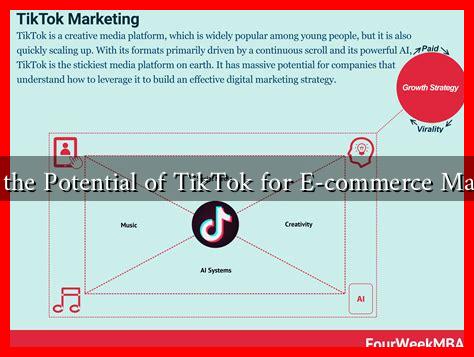-
Table of Contents
What Is the Potential of TikTok for E-commerce Marketing?
In recent years, TikTok has emerged as a dominant force in the social media landscape, captivating millions of users worldwide with its short-form video content. As brands seek innovative ways to engage consumers, TikTok’s potential for e-commerce marketing has become a hot topic. This article explores how TikTok can be leveraged for e-commerce, the strategies that brands can adopt, and the success stories that highlight its effectiveness.
The Rise of TikTok in E-commerce
Launched in 2016, TikTok has quickly grown to over 1 billion active users globally, making it one of the most popular social media platforms. Its unique algorithm promotes content based on user interests rather than follower counts, allowing brands to reach a wider audience organically. This democratization of content visibility is particularly beneficial for e-commerce brands looking to increase their reach.
Why TikTok is Ideal for E-commerce Marketing
Several factors contribute to TikTok’s suitability for e-commerce marketing:
- Engaging Content: TikTok’s format encourages creativity and authenticity, allowing brands to showcase products in entertaining ways.
- Viral Potential: The platform’s algorithm can propel content to virality, providing brands with the opportunity to reach millions without a significant ad spend.
- Influencer Collaborations: TikTok influencers have substantial sway over their followers, making partnerships a powerful tool for product promotion.
- Integrated Shopping Features: TikTok has introduced features like TikTok Shopping, allowing users to purchase products directly through the app.
Successful E-commerce Strategies on TikTok
Brands can adopt various strategies to maximize their e-commerce potential on TikTok:
- Product Demonstrations: Short videos showcasing how to use a product can effectively engage viewers. For example, beauty brands like Glossier have successfully used tutorials to highlight their products.
- User-Generated Content (UGC): Encouraging customers to create content featuring your products can enhance authenticity. Brands like Fashion Nova have thrived on UGC, showcasing real customers wearing their clothing.
- Challenges and Hashtags: Creating branded challenges can encourage user participation and spread brand awareness. The #GuacDance challenge by Chipotle is a prime example, leading to a significant increase in avocado sales.
- Influencer Partnerships: Collaborating with TikTok influencers can amplify brand messages. For instance, the partnership between Bretman Rock and various beauty brands has resulted in substantial sales boosts.
Case Studies: Brands Winning on TikTok
Several brands have successfully harnessed TikTok for e-commerce marketing:
- Gymshark: The fitness apparel brand leveraged TikTok influencers to promote their products, resulting in a 200% increase in sales during a campaign.
- Elf Cosmetics: Their viral campaign featuring the #EyesLipsFace challenge generated over 3 million user-generated videos, significantly boosting brand visibility and sales.
- Rihanna’s Fenty Beauty: The brand’s strategic use of TikTok influencers and engaging content led to a surge in product demand, showcasing the platform’s power in driving e-commerce success.
Challenges and Considerations
While TikTok offers immense potential for e-commerce marketing, brands must navigate certain challenges:
- Content Saturation: With many brands vying for attention, creating unique and engaging content is crucial.
- Understanding the Audience: Brands must invest time in understanding TikTok’s predominantly younger audience to tailor their messaging effectively.
- Ad Spend: While organic reach is possible, brands may need to allocate budget for paid promotions to enhance visibility.
Conclusion
As TikTok continues to grow, its potential for e-commerce marketing is undeniable. Brands that embrace the platform’s unique features and engage creatively with their audience can unlock significant opportunities for growth. By leveraging strategies such as influencer partnerships, user-generated content, and engaging challenges, businesses can effectively tap into TikTok’s vast user base. However, understanding the platform’s dynamics and audience is essential for success. As the e-commerce landscape evolves, TikTok stands out as a powerful tool for brands looking to connect with consumers in innovative ways.

